- Home
- Liz Braswell
A Whole New World
A Whole New World Read online
Copyright © 2015 Disney Enterprises, Inc.
Cover design by SJI Associates and Scott Piehl
Cover illustration by Mike Heath
All rights reserved. Published by Disney Press, an imprint of Disney Book Group. No part of this book may be reproduced or transmitted in any form or by any means, electronic or mechanical, including photocopying, recording, or by any information storage and retrieval system, without written permission from the publisher. For information address Disney Press, 1101 Flower Street, Glendale, California 91201.
ISBN 978-1-4847-0770-8
Visit www.disneybooks.com
Contents
Title Page
Dedication
Prologue
All This for a Loaf of Bread
…But for an Apple
The Cost of Knowledge
The Agrabah No One Sees
The Cave of Wonders
Jasmine and a Genie
Genuflect, Show Some Respect
The Plans of Jafar, the Fate of the Djinn
The Street Rats
A Rescue of Sorts
The Birth of an Army
Unraveling
A Heist
Robber Queen
Deadly Magic
Tea with a Genie
Friends in Unlikely Places
A Declaration of War
Sympathies and Strategies
The Plan
A Pause Before the Dust Storm
Seems Like Old Times
Dawn Approaches
Casualties of War
The Final Wish
The End—of Magic
Epilogue
About the Author
For my son Alex—who is not, technically, a scamp and is now old enough to read the books I write. Enjoy!
Additional thanks to David Kazemi for details that helped bring ancient Agrabah to life, even if we can’t agree on what makes a good baklava.
—L.B.
A HIGH WHITE MOON cast its light on the city below as brightly as the sun was said to shine in northern countries. White mud-brick buildings gleamed like pebbles from a faraway beach. The golden onion domes of the capital glittered like a dream against the pale dunes and the dark, starry void.
The heat of the day had long since retreated into the desert, and the city, which had drowsed through the hot afternoon, was finally coming alive. The streets filled with people drinking tea and gossiping, laughing, and visiting friends. Old men played chatrang on boards set up outside cafés; children stayed up long past their bedtimes playing their own games on the sidewalks. Men and women bought rose-flavored ices and trinkets from nighttime vendors. Life was noisy and exuberant in moonlit Agrabah.
Well, not everywhere in Agrabah.
In another part of town, the streets were silent as shadow and black as death. It was not safe for any of the gaily dressed people to be there. Even the locals tended to stay indoors or stick to the unseen alleyways and secret passages that riddled the area out of view from the streets. Here the white walls of the buildings were faded and pitted, mud peeling away from their brick underlayers in great swaths. Half-built timber structures were the only evidence of an ancient sultan’s dream to improve the district, to widen the roads, to bring in water. After he was poisoned, the whole project was dropped. Now the skeletal remains of his grand plan whistled in the desert wind like corpses hanging from gibbets.
This was the Quarter of the Street Rats.
This was where thieves, beggars, murderers, and the poorest of the poor lived. The children no one wanted, the adults no one would hire for any kind of honest work, all of them made their homes there. The orphaned, the unlucky, the sick, and the discarded. It was a whole other Agrabah.
Among the huts and hovels, the falling-down public buildings, and the decaying houses of worship was one tiny home that was slightly better kept up than the others. Its mud walls looked like they had been whitewashed at least once in the past decade. A broken urn outside the door contained a clutch of desert blooms, kept alive by someone’s regular application of precious water. A proper rug, albeit in tatters, lay in front for visitors to leave their sandals on—in the unlikely event they owned a pair.
Through a keyhole-shaped window, passersby could hear the soft sounds of a woman humming. If they peeked through the wooden screen, they would see her: a kind-eyed woman who wore her rags with the grace of a queen. Her clothes were clean, as was the pair of pants she was carefully mending in the spotted shaft of moonlight that came through the window.
A loud knocking sounded on her door. Three strikes, and very powerful. No one in the Street Rat district knocked like that. Always it was furtive, and often in code.
The lady looked surprised but carefully set down her work and adjusted her headscarf before approaching the door.
“Who is it?” she called, fingers on the handle.
“It’s me, Mom,” said a voice.
The woman smiled with pleasure and unhooked the latch.
“But, Aladdin,” she admonished laughingly, opening the door, “you know better than to—”
She stopped when she realized four people were standing in the doorway.
One was her son, Aladdin. He was scrawny, like all the children of Street Rats. Barefoot, with dark skin and thick raven-black hair like his father’s, which was covered in the dust of the street. He held himself as his mother had taught him: head high, chest up. Street Rat in name only.
His friends—if she could use that word—stood a little to the side, giggling and looking ready to bolt. If there was trouble, of course Morgiana and Duban would be involved. Aladdin’s mother clenched her teeth at their sly eyes and obvious zeal to get away.
Behind Aladdin stood a tall, skinny man in a long blue robe and matching turban. Akram, the dried-fruit and nut seller. He had her son’s shoulder in a bony grip that threatened to tighten if the boy so much as thought about escaping.
“Your son,” Akram said politely but angrily, “and his…compatriots. Once again they were at the market, stealing. Empty your pockets, Street Rat.”
Aladdin shrugged endearingly. As he did, he pulled the insides of his pockets out, revealing dried figs and dates. He was not so careless as to let them fall to the floor, however.
“Aladdin!” his mother said sharply. “You wicked boy! I’m so sorry, good sir. Tomorrow Aladdin will run errands for you all day. Whatever you want. He will fetch you water.”
Aladdin started to protest, but a look from his mother silenced him. Duban and Morgiana laughed at him.
“And you two should, as well,” she added.
“You’re not my mother,” Morgiana said insolently. “You can’t tell me what to do. No one can.”
“It’s unfortunate you don’t have a mother like this poor woman,” Akram said sternly. “You will wind up with your head on a spike before you’re sixteen, girl.”
Morgiana stuck out her tongue at him.
“Come on,” Duban said, a little nervous. “Let’s get out of here.”
The two scampered off into the night. Aladdin looked after them dolefully, abandoned by his friends to punishments they all deserved.
“You would do well to avoid their company, I think,” Akram said thoughtfully. “But all three of you are lucky it was I who caught you, and not another. There are some vendors who would demand your hand in payment for the fruit you stole.”
“Here, let me wrap up your goods to take back with you,” Aladdin’s mother said, taking the fruit from her son and looking around for a suitable cloth to hold it.
“That’s all right,” Akram said uncomfortably. His eyes darted around the tiny, dark hovel. “I have already packed up for the day. And a hardworking woman who is so…alone shouldn�
��t be punished for the sins of another. Consider it a gift.”
Aladdin’s mother’s eyes flashed.
“I do not need your charity. My husband will return any day now,” she said. “Cassim will have made his fortune and will take us to a place more fitting for his family. I’m just ashamed of what he has to come back to in the meantime.”
“Of course, of course,” Akram said soothingly. “I…eagerly await seeing him again. He loved my cashews.”
Aladdin’s mother basked in the glow of someone else’s memory of her husband, as secondhand as it was.
Aladdin slumped. Akram’s hand returned to his shoulder, but instead of the hard pinch of an angry captor, it gave the nervous pat of someone who felt sorry for the boy.
This only made Aladdin feel worse.
“Here now, is everything all right?”
A market guard, one of the younger ones, strode out of the night. He held a cudgel in his hand and had a serious look in his eye. “I heard there was a disturbance at your tent, Akram.”
“It is nothing, Rasoul,” the merchant said, just as soothingly as he had talked to Aladdin’s mother. “A misunderstanding. It is all sorted now. Thank you for your concern.”
The guard, whose only sin seemed to be indulging in a little too much pastry, did not press the matter as other guards might have. He saw the quietly determined woman, the dejected-looking Aladdin, the poverty of the house.
“All right, then. Akram, I will walk you back to your tent. This is not a safe place for respectable people like yourself to be at night.”
“A thousand thanks, Rasoul.” Akram gave Aladdin’s mother a bow. “Peace be upon you.”
“And to you,” she said, nodding her head. “And…thank you.”
When the merchant and the guard left, she closed the door wearily and ran a hand through her son’s hair.
“Aladdin, what are we to do with you?”
“What?” he demanded, no longer slumped but grinning like a thief and jumping up and down with excitement. “Everything worked out! And look! We have a feast tonight!”
He excitedly pulled more figs and dates out of his pockets and put them in a chipped bowl. And then, from the sash that held up his pants, he pulled fresh almonds and smoked pistachios…and from somewhere under his scrap of a shirt, cashews.
“Aladdin!” His mother admonished him, but she was trying not to chuckle.
“I did it for you, Mom. You deserve a treat. You never get anything for yourself.”
“Oh, Aladdin, I don’t need anything. Except you,” she said, taking him in her arms and holding him tightly against her.
“Mom,” Aladdin whispered into her robes. “I’ve seen you give me the biggest part of whatever we have to eat. It’s not fair. I just want to take care of you.”
“There are a lot of things that aren’t fair, Aladdin.”
She drew back from him, still holding his hands, and looked into his eyes.
“That’s just the way life is—which is why it’s so important for Street Rats to take care of each other. That’s a good instinct you have. You should always look out for your friends and your family. Because no one is looking out for us.
“But that doesn’t mean you should become a thief.”
Aladdin looked at the ground, chagrined.
She put her hand under his chin to make him look up at her.
“Don’t let life’s unfairness, don’t let how poor you are decide who you are. You choose who you will be, Aladdin. Will you be a hero who looks after the weak and powerless? Will you be a thief? Will you be a beggar—or worse? It’s up to you, not the things—or people—around you. You can choose to be something more.”
He nodded, lip trembling. He was too old to cry. He was.
His mother kissed him again and sighed, then moved past him to examine the fruit.
“Maybe it’s because you’re just alone here with your mother all the time,” she said, partly to herself. “You don’t have any playmates except for those good-for-nothings Duban and Morgiana. You need a real friend, or maybe a pet, or something. Yes, a pet…”
But Aladdin wasn’t listening.
He moved to the window and pushed aside the screen. This was the best, the only good thing about their house: due to a trick in the zigzag streets, a hole in the mind of an architect, they had a perfect view of the castle.
He looked at the white towers, even whiter under the moonlight, the glittering onion domes, the colorful flags flying from spires so pointy and perfect they looked like they could pierce the sky itself.
You can choose to be something more.…
PERHAPS THERE WAS a moon in the sky somewhere, but her brother the sun ruled now, and everything faded into the whiteness of the hot day—which was even hotter on a glaringly bright sun-bleached roof.
“Safe!” Aladdin said with a grin, clutching his dearly gotten treasure. He took a quick look over the edge of the building to make sure no one saw him up there, his dark arms flexing with easy strength as he held his chest off the rough bricks. Then he sat down, relaxed, getting ready to break his precious prize in half. His large, clear brown eyes twinkled in happy expectation. “One loaf of bread. More valuable than all the cold, glittering gems at the bazaar.”
The little monkey next to him chattered in anticipation.
Abu had been a last gift from his mother. Aladdin’s father, of course, had never come back from “seeking his fortune abroad.” Aladdin had never believed in that fairy tale anyway, so it was no great loss. But his mother had been afraid of his becoming too wild, too much of a loner without a real family. She’d thought a pet would tame him.
And perhaps it had…
…except that he stole for both of them now.
“And lunch is finally served,” Aladdin said, gesturing at his friend with the bread.
“Stop, thief!”
Abu fled. Aladdin leapt up.
Somehow the market guards had actually managed to clamber up the ladder onto the roof behind him. Two had made it up, anyway, with an enraged Rasoul following close behind. These days he wore the striped turban crowned with a black onyx that marked him as a captain of the guard. Despite their run-ins, even Aladdin had to admit that the man had risen honestly through the ranks.
But that didn’t mean Aladdin liked him.
“I’ll have your hands for a trophy, Street Rat!” Rasoul bellowed. He puffed as he dragged his body up the ladder.
He must have been doubly annoyed by the effort he had to expend to get up there.
“All this for a loaf of bread?” Aladdin asked, exasperated. He had specifically chosen to lift it from one of the carts loaded up for a royal outing—a picnic for the sultan, for one of his desert kite-flying romps or something equally ridiculous. As fat as he was, one tiny sultan couldn’t possibly have missed one little loaf of bread.
But apparently the guards could. And under the law, if an accuser chose to, he could have a thief’s hand chopped off in punishment.
And Rasoul’s scimitar was looking particularly shiny and pointy in the sunlight at the moment.
So Aladdin leapt off the side of the building.
Aladdin was many things: quick, strong, clever, agile, fast-thinking, nimble.
He was not rash.
So while the guards stopped short, shocked at what seemed like a deadly, incredibly insane act, an only mildly nervous Aladdin plummeted down toward the street, grabbing at the clotheslines he knew would be there.
There was, of course, always the chance that the ropes wouldn’t hold.
But Aladdin had luck on his side; throwing his hands out only resulted in being hit in the head by clean laundry and getting rope burns as he slowed his descent. When it grew too painful to bear, he let go and landed with a bruising, bony crash on the dusty street.
There was no time to reflect on his safety, his luck, or any injuries that would have to be looked at later. He had to plan his next move immediately, to stay one step ahead of the guards who w
ould be hurrying back down to see what had happened to him.
The Widow Gulbahar’s robes were tangled around him. It occurred to Aladdin that if no one saw, he could easily wrap himself up in them and disguise himself as a pious—albeit ugly—girl and sneak out through one of the harems.
He paused as loud feminine laughter erupted above him.
He looked up to see the widow herself leaning out a window and smiling not unkindly at him. Two other women stood nearby, where they’d been enjoying a good gossip before his exciting arrival. That would be their only pleasure today before the task of finding food, and work, began.
“Isn’t it a little early for you to be in trouble already, Aladdin?” Gulbahar teased.
“You’re…ouch…only in trouble…ouch…if you get caught,” Aladdin protested, trying not to show pain as he rose and joined them. He hoped they’d gotten the hint as he swirled a cloth around his head and neck. He leaned on the wall in what he hoped was a feminine way, throwing his hips out and keeping his back to the end of the alley where the guards would enter.
Gulbahar rolled her eyes and shook her head.
“Aladdin, you gotta settle down,” she sighed. “Get a nice girl. She’ll fix you up.”
The other women nodded in agreement. They knew about nice girls—being far removed from the definition. But they had to eat, and often in Agrabah nice girls didn’t.
“There he is!” Rasoul suddenly called out. He and a whole squad of guards stomped down the alley, closing off Aladdin’s exit.
“Now I’m in trouble,” Aladdin said.
He turned to go, but Rasoul must have put all his remaining anger and energy into one furious lunge. He managed to grab Aladdin’s arm and spun him around.
“This time, Street Rat, I’ll—”
But before he could finish his threat, a screaming little monkey leapt onto his head and tore at his eyes with sharp claws.
“Perfect timing, Abu,” Aladdin said dramatically for the benefit of the women watching.
Then he ran.
He scooted around Rasoul and managed to duck past the rest of the guards as they grabbed at him ineptly. Ten of them weren’t worth one Rasoul—thank goodness. He was the only one Aladdin needed to worry about—and he knew the streets almost as well as the boy did.

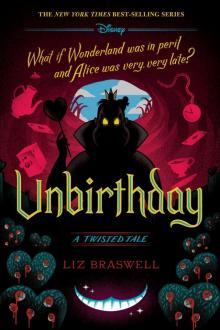 Unbirthday
Unbirthday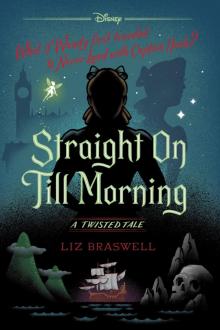 Straight On Till Morning
Straight On Till Morning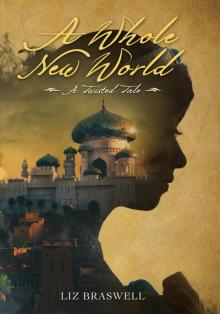 A Whole New World
A Whole New World Once Upon a Dream
Once Upon a Dream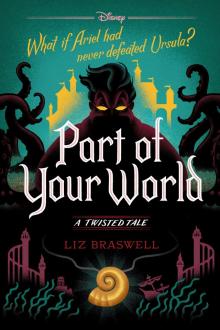 Part of Your World
Part of Your World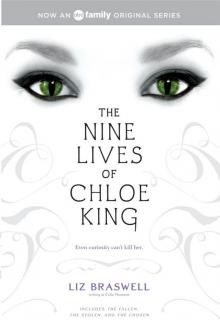 Nine Lives of Chloe King
Nine Lives of Chloe King The Fallen
The Fallen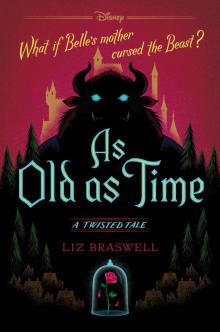 As Old As Time: A Twisted Tale (Twisted Tale, A)
As Old As Time: A Twisted Tale (Twisted Tale, A)